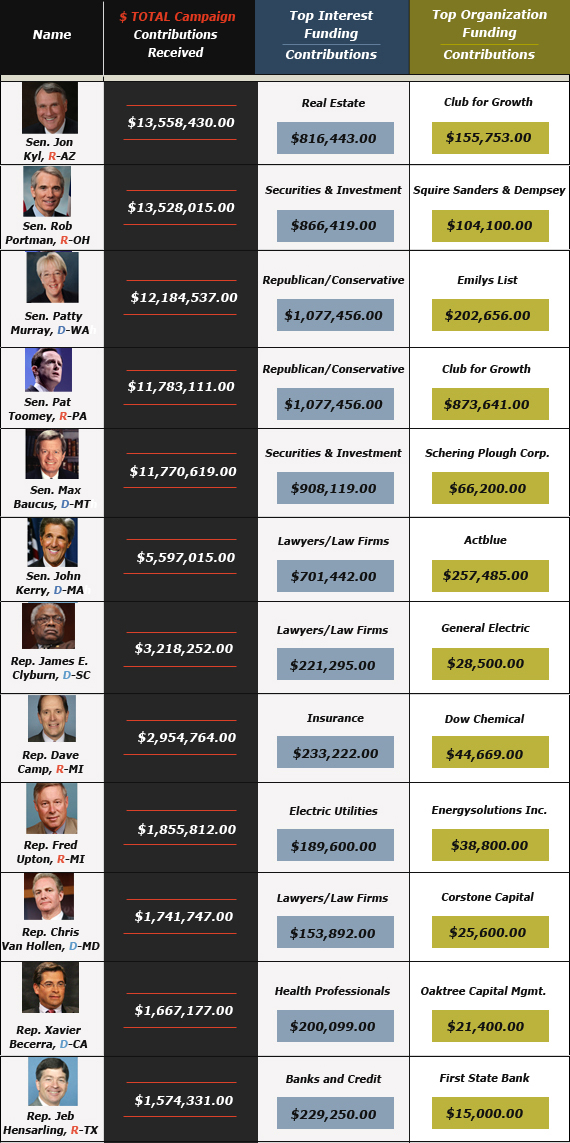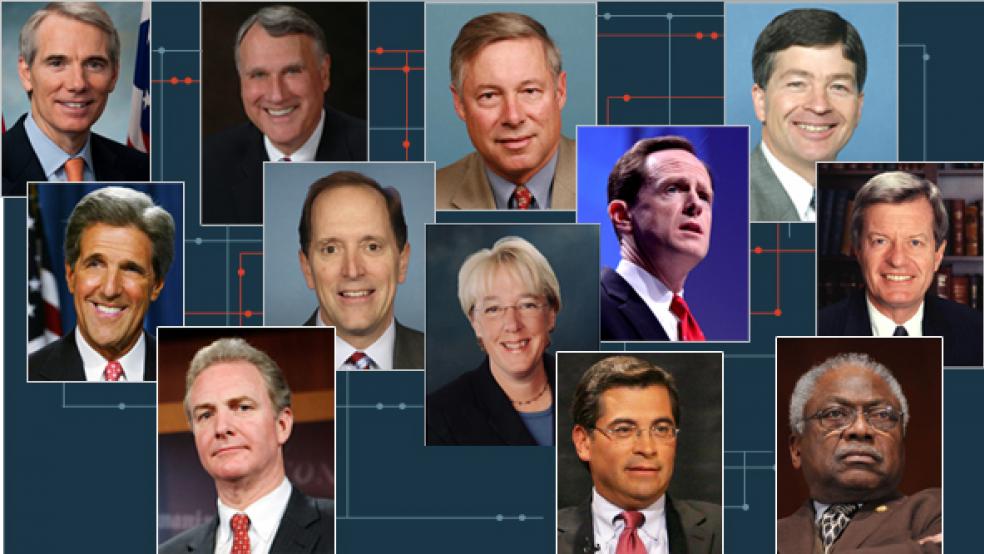With a $1.2 trillion deficit reduction axe poised to fall in December, corporate lobbyists are lining the hallways of the nation’s capitol to ensure their clients’ necks aren’t on the chopping block.
Will these special interests be able to buy their way to a more solicitous consideration of their views? One thing is certain, for the 12 senators and representatives serving on the Super Committee to arrive at a compromise in December, some campaign contributors will have to take a haircut.
And that’s because any compromise is unlikely to include new tax revenues, which Democrats back, since it would require several members to turn their backs on the anti-tax Club for Growth, which is the single largest contributor to two Republican Senators on the committee. Pat Toomey , a freshman from Pennsylvania, served as president of the group before running for the Senate a second time in 2010.
Analysts sifting through the campaign finance reports of the Super 12 say the pattern of donations makes it highly unlikely they will vote to raise taxes to limit the size of the reductions in domestic and military programs needed to reach over $100 billion a year in spending cuts over the next decade. Without new revenue, neither can be held sacrosanct to arrive at that level of deficit reduction.
Yet with higher income taxes off the table, most revenue options boil down to eliminating tax breaks and loopholes, treating hedge fund pay as income instead of capital gains, or imposing new fees on stock market transactions. The latter two are not likely, say the campaign finance analysts.
“The number two industry making contributions to the group was financial services with Goldman Sachs, Citigroup and Bank of America topping the list,” said Daniel Newman, executive director of MapLight, a non-partisan watchdog group that released an analysis Monday of the dozen’s campaign contributions. Hedge fund operators are also major contributors. “You can be pretty sure a securities transaction tax is not going to be part of the recommendations,” Newman said.
Most fiscal analysts say cuts to health-related entitlement programs like Medicare and Medicaid must be part of the final package to reach $1.2 trillion in deficit reduction. Yet health professionals and the pharmaceutical industry are among the top three industries contributing to Rep. Dave Camp, R-Mich., Fred Upton, R- Mich., Rep. Chris Van Hollen, D-Md., Rep. Xavier Becerra, D-Cal., and Sen. Jon Kyl, R-Ariz., according to the Maplight analysis, which looked at the last two years for House members and the last six for Senators.
Even when aggregated contributions from health-related firms do not represent a large share of a committee member’s contributions, individual health firms play a major role. Sen. Max Baucus, D-Mont., for instance, counted drug firm Schering-Plough as his single largest contributor over the last election cycle. Rep. James Clyburn, D-S.C., listed Davita International, a leading dialysis firm heavily dependent on Medicare funding, as his third largest contributor.
While voting on defense spending tends to break down along ideological lines with liberal Democrats more likely to seek cuts than either more conservative Democratic Party members or Republicans, defense-related industries are well positioned to ask several members of the committee to defend their interests, based on the pattern of campaign contributions. Patty Murray, D-Wash., for instance, has been a prodigious fundraiser over the past six years, raising $16 million from a variety of interests. But it includes $172,780 from employees of Boeing, which has a major presence in her state and is a major defense contractor.
Conventional wisdom says that the evenly divided bi-partisan committee will come up with a compromise since the alternative – across-the-board cuts that include both defense and domestic programs without any tax increases – is unacceptable to either side. Yet the ideological divisions rending American politics have turned it into a blood sport with one side – the Republicans – dominated by its extreme right wing, which appears willing to sacrifice the health of the nation’s economy, at least in the short run, in order to win its long-standing goal of dismantling social programs for the less well-off.
Some analysts say this shift to ideological politics on the Republican right has made political outcomes less dependent on campaign contributions than in past political battles. “(Contributions) matters less than partisanship, ideology and constituency interests,” said Richard Briffault, a professor at Columbia Law School who has studied the relationship between campaign contributions and legislative voting patterns.
Now, campaign contributors are more likely to target their donations to candidates who are already in tune with their interests, and not rely on giving money in the heat of a campaign in the hopes of being able to talk to the winners later. “In the last ten years, partisanship and ideology have become so much bigger than the access model,” he said.

Senators Pat Toomey and Jon Kyl, Republicans from Pennsylvania and Arizona, respectively, are representative of the new breed. It’s unlikely they will vote for even a sliver of the deficit reduction coming from tax increases when the single largest donor to their last campaigns was the Club for Growth.
The group was launched in 1999 with the goal of limiting taxes and shrinking government, which it claims will boost economic growth. The Club for Growth Action political action committee spent nearly $6 million in the 2010 election cycle – the most in the group’s short history, according to data on the Center for Responsive Politics website.





